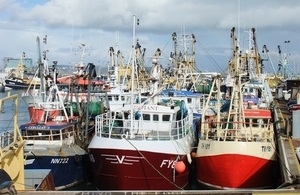Smart boats could revolutionise UK fishing and seafood industries
Seafood Innovation Fund will reward cutting-edge innovation.

Fishing boats in Brixham harbour.
The Environment Secretary Michael Gove has today delivered a boost for innovation in the UK fishing and seafood industries with the opening of a new £10 million research and development fund.
The move paves the way for the potential use of artificial intelligence by fishermen and providing a potential double return on investment for the UK economy.
With the UK fishing industry contributing around £1.4 billion to our economy, employing over 24,000 people, there is huge opportunity for innovation to improve the technology available across the sector.
Unlike existing funding programmes, the Seafood Innovation Fund will focus on delivering longer-term, cutting-edge innovation.
UK businesses are already developing satellite technology and virtual watch rooms to track vessel movements, and integrating lighting into fishing nets to reduce unwanted catch and improve efficiency. But with the global fishing industry worth nearly £300 billion, this fund will encourage further technological development and unlock export opportunities around the world for UK technology pioneers.
Environment Secretary Michael Gove said:
This government is investing record amounts in research and development, with this £10 million fund further driving UK innovation.
As the UK establishes itself as an independent coastal state, the Seafood Innovation Fund will bring together our world-leading fishing, seafood, and technology industries to deliver more sustainable and productive fisheries for the future.
Dr Joanna Cox, Head of Policy at the Institution of Engineering and Technology said:
This fund is a ‘call to action’ for fishermen and engineers to work together to bring forward sustainable and productive solutions at scale to the industry’s greatest challenges.
Technology continues to deliver transformational change across the food sector, for instance, boosting the UK farming sector through AI and robotics. We welcome the Secretary of State’s announcement and urge the UK engineering community to apply the same pioneering zeal to positively impact the UK’s seafood industries through this £10m Seafood Innovation Fund.
Opportunities for innovation will cover all parts of the seafood sector, from catch techniques and fish feed to the management of fisheries. Possible examples of areas that could receive funding include:
- Minimising unwanted catches and monitoring catches – innovations to fishing gear to reduce environmental impact and better capturing of real-time catch data to avoid unwanted catches and sensitive species
- Sorting and processing of catch – automation of landed catch, improving animal welfare and leading to a higher survival rate for discarded fish
- Information for fisheries management – improved data available for fishing vessels and regulators to enable better decision making on the future management of fishing stocks.
- Advances in sustainable aquaculture – innovation around compensatory aquaculture whereby waste from one form of aquaculture provides a food source and nutrients for another type.
UK Government Minister Lord Duncan said:
The fishing and seafood sectors are vital to many of Scotland’s communities and help to support thousands of jobs across the country. The UK Government’s Seafood Innovation Fund is helping to support the industry with the technology needed to improve environmentally sustainable fishing practices while streamlining costs.
By contributing to research and development in the sector, the UK Government is looking after the industry’s long term interests and supporting Scotland’s economy.
Through the modern Industrial Strategy, government is providing the biggest boost to research and development funding in UK history and has set the ambition to boost public and private investment in research and development to 2.4% of GDP by 2027.
The delivery of the fund, which will benefit companies in every corner of the UK, will be overseen by an Executive Board, including representatives from the Devolved Administrations in Scotland, Wales, and Northern Ireland.
The fund, which was first announced in the 2018 Budget, will be delivered by the Centre for Environment, Fisheries and Aquaculture Science (Cefas), the UK’s world leader in marine science and technology, with oversight from Defra using money from the Chancellor’s National Productivity Investment Fund.
Organisations are encouraged to bid for funding through the Delta procurement portal.